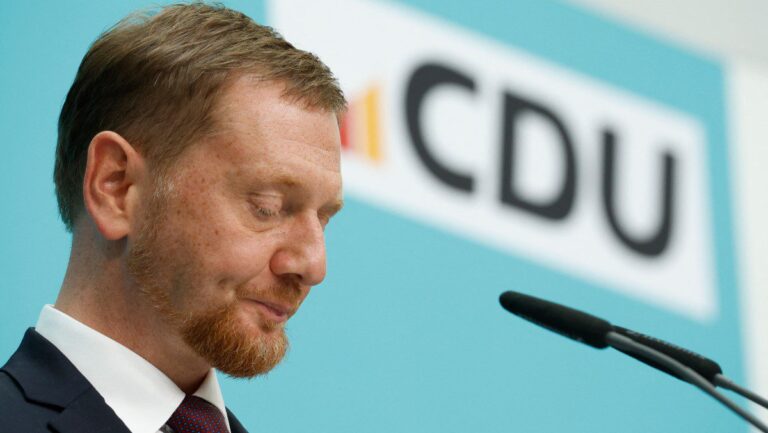With the European Green Deal meeting resistance, the EU Commission is planning for its next sweeping political agenda: a global, planned economy.
The Commission is now funding—to the tune of €10 million—the ‘Post-Growth Deal,’ a project that proposes to provide the framework of the next New Deal, this one based on the concept of economic degrowth.
According to the World Economic Forum, degrowth “broadly means shrinking rather than growing economies, to use less of the world’s dwindling resources.” For many of its advocates, it means a planned restriction on economic growth and a rationing of resources by the government. In its most pernicious forms, it includes population control.
As envisioned by the project recently funded, it seems to mean assessing the quantity of natural resources available on a global level and then instituting a global rationing. It would possibly entail wide impositions by governments that will affect the day-to-day lives of ordinary citizens and equate to some form of restriction on basic civic freedoms as they are now enjoyed, such as movement, in which some will likely find themselves more restricted than others. Conservatives generally reject outright the idea of a globally controlled degrowth project, however, even some who do advocate for degrowth are now sending up alarms of undemocratic social engineering, cloaked as the good intention of preserving both man and nature.
The website of the European Research Council, the EU’s research funding arm, describes the project using rhetoric designed to cloak its purpose. It hopes
to offer new pathways for what the researchers call a “post growth” era, in which achieving universal human wellbeing is achieved within planetary boundaries—and removed from dependence on economic growth.
The project’s goal, however, is far from benign, or liberating.
To begin, arguments about whether there is a limit to economic growth, in terms of expanding GDP based on the availability of natural resources, have abounded for decades. The arguments persist in part because there is no consensus on what “planetary boundaries” exist or what “independence from economic growth” might mean for civilization. In fact, notions of an ultimate limit to economic growth, or the means by which economic growth might be intentionally limited, have, so far, not been embraced by the principal financial and political institutions, such as the EU and European Central Bank.
Nevertheless, the project’s goals sound familiar. Increasing political focus on environmental issues (particularly ‘climate change’) has helped move the debate on potential limits to economic growth from the fringes and closer to the mainstream.
“I see fast change. I’ve been working 12 years on degrowth and it is the first time that I see so much interest,” researcher Giorgios Kallis told resilience.org, adding that several other projects with a degrowth aspect had received EU funding recently.
According to the European Research Council, the economic degrowth project hopes to meet the Utopian goal for (clean) peace on earth, answering the question, “How can dramatic reductions in energy and resource use be achieved, while at the same time ending poverty and ensuring decent lives for all?”
The researchers explain degrowth both in terms of the ‘climate crisis’ and as a sign of Europe’s economic weaknesses, such as slowing industry in Germany. The website of one of the participating universities claims:
To reduce emissions fast enough to meet the Paris targets, and to reverse other ecological pressures, high-income economies will need to dramatically reduce their use of energy and material resources. But sufficient reductions may be difficult to achieve if countries continue to pursue economic growth—ever-increasing levels of industrial production—as a primary objective.
Degrowth offers a solution to what it calls a post-growth world. This ‘Post-Growth Deal’ refers to a new iteration of
the New Deal, or the welfare state, but now geared around the security of well-being in an era of prolonged economic stagnation and unfolding climate breakdown.
The research purports to provide the “new research, new data, and new models” necessary to achieve such a reconfiguration.
Underwritten by €9.9 million from the EU, the ‘Post-Growth Deal (REAL)’ project got underway in May and is scheduled to be completed in 2029. The three academics at the helm are environmental scientist Giorgos Kallis, of the Autonomous University of Barcelona; anthropologist Jason Hickel, of the same institution; and ecological economist Julia Steinberger, from the University of Lausanne.
The project includes modelling the availability of natural resources and their global use.
“We will first determine the planetary space of possibilities, modelling the use of resources needed to live decently, and identifying how resources can be shared equitably between North and South,” Steinberger said in an interview with Geoblog.
There is no mistaking the global scope of their project. Hickels explained that the goal was to outline “a convergence between the global North and South of the globe” around “levels of resource use” that are “sufficient for high human development and compatible with planetary boundaries.”
Researchers intend to implement their goals through public policy, for both the EU and for developing countries. Mirroring the European Green Deal, but expanding beyond the borders of Europe, the project includes “post-growth policy packages for the Global North and South,” Steinberger explained. She acknowledged that passing such legislation and achieving a “post-growth transition” politically will require deft analysis.
Also under examination are “alternative supply systems”—likely meaning alternatives to the current global supply chains and to fossil fuels. Dr. Steinberger claimed that the researchers “will explore the practical implementation through participatory planning.”
The webpage for the economic degrowth project on the website of the Autonomous University of Barcelona states that participants will be “working with four representative communities to co-produce knowledge and action on the ground.”
“Basically the idea is to try to bring degrowth’s abstract ideas to the ground and think more concretely about the metabolisms, policies, economics and politics that can make degrowth real,” Kallis told resilience.org.
Whatever the reasons or means, it seems an increasing number of politicians and bureaucrats in Brussels are flirting with degrowth as the next social and economic paradigm.
Last May, EU Commission President Ursula von der Leyen spoke at the ‘Beyond Growth’ conference held in Brussels. In her statements, she said that GDP could no longer be the most important measure of human flourishing and touted the Green Deal as able to achieve the same goals as those degrowth advocates seek—promoting human flourishing while using less natural resources, particularly petroleum—but contradicted the need to intentionally slow economic growth.
Nevertheless, the Green Deal claims to be able to ‘decouple’ resource use from economic growth without sacrificing economic prosperity, a proposal economists and others say is impossible.
At the same time, with Europe stagnating economically and demographically, while also facing an energy crisis that only makes economic growth and general prosperity more difficult to attain, a ‘Post-Growth Deal’ is either totally out of touch or it’s perfectly, and politically, manufactured.
It all depends on your juxtaposition to the halls of power where such deals are brokered.





